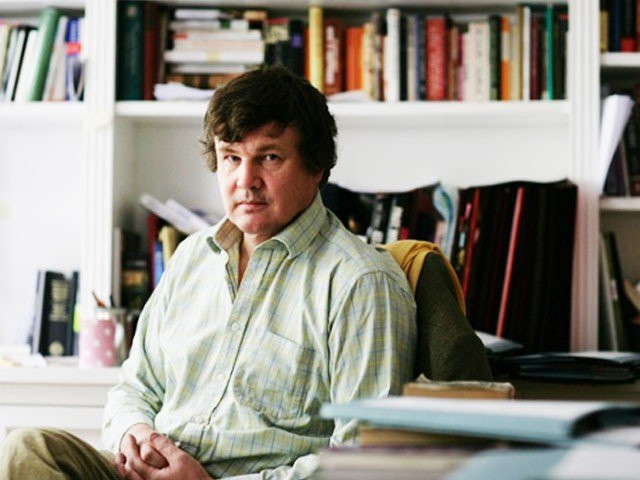Peter Oborne visits North Waziristan to see how Pakistan managed to survive terror
‘Pakistan swayed world that men of terror can be defeated’, he said

PHOTO: AFP
The battle, however, continues with remnants of militant outfits that still carry out periodic, bloody attacks in the country.
79 militants lay down arms in North Waziristan
Peter Oborne – the first veteran western journalist to have visited North Waziristan in many years – visited Miranshah, the capital of the agency to see how Pakistan managed to survive the darkest days of the country’s descent into terror.
 Pakistani soldiers stand guard as people, who fled the military offensive against militants in North Waziristan, receive food supply, July 25, 2014. PHOTO: REUTERS
Pakistani soldiers stand guard as people, who fled the military offensive against militants in North Waziristan, receive food supply, July 25, 2014. PHOTO: REUTERS“I have travelled regularly to Pakistan… At times, the country seemed on the verge of collapse. Indeed, at one point it was regarded by global intelligence agencies, including Britain’s MI6, as the most dangerous state in the world,” said Oborne.
Walking down the streets, he recalled how Taliban commanders used to order public beheadings and Al Qaeda chiefs groomed young children to be suicide bombers.
Oborne said, “It seemed unimaginable back then that Al Qaeda and the Taliban would be driven out of Pakistan’s tribal territories. Yet the Pakistan army now claims that every last Taliban fighter has been expelled”.
When the Pakistan Army took control of Miranshah from the Taliban after a bloody war, the city presented a horrible state. Hundreds of girls’ schools, marketplaces and houses were flattened.
Terror purge: Final push begins in North Waziristan
But now, Oborne saw locals, who had previously fled the area, returning to their homes.
“The destruction of the city was a price that had to be paid as the only way of driving out the terror chiefs who he says had held the citizens of Miranshah hostage,” Major General Hassan Azhar Hayat, who commands Pakistan’s 7th Division on the north-west frontier, told the journalist.
 People fleeing the military offensive against the militants in North Waziristan, June 23, 2014. PHOTO: REUTERS
People fleeing the military offensive against the militants in North Waziristan, June 23, 2014. PHOTO: REUTERSThe military operation lasted for two years to recover the North Waziristan agency from terrorists’ control.
“In total, the army found 310 tonnes of explosives, 25,000 rifles and more than two million bullets. The military uncovered a terrorist infrastructure that included a media centre hidden in the basement of a mosque, secret prisons where kidnap victims were held, and deep tunnels to protect fighters from precision bombs,” said Major General Hassan Azhar Hayat.
Oborne said the Pakistan Army was persuaded that it has won the war on terror after 15 years of horror in its tribal regions and the statistics also supported their stance since violence in Pakistan has fallen by three-quarters in the past two years.
He said, however, terrorists have either been killed or have fled across the border into Afghanistan, where they have regrouped to launch attacks in Pakistan. To counter this threat, Oborne added that Pakistan has built over 1,000 border posts to prevent terrorists crossing back into the country.
Winning the war on terror
Overall, Oborne believed Pakistan’s progress against the terror cells has been extraordinary, at least in the North Waziristan agency.
“And there have still been terrible atrocities, such as a recent attack on the shrine of Sufi Saint Lal Shahbaz Qalandar in Sehwan Sharif which killed 88 and left many horribly injured,” the journalist remembered.
Army clears last militant stronghold in North Waziristan
At the height of the terror attacks in the agency three years back, Karachi was ranked the sixth most dangerous city in the world. Now, the city ranked 32nd.
 Soldiers drive toward North Waziristan, from Bannu, June 20, 2014. PHOTO: REUTERS
Soldiers drive toward North Waziristan, from Bannu, June 20, 2014. PHOTO: REUTERSMilitary strategists blamed Tony Blair’s misguided decision to invade Iraq to remove Saddam Hussein in 2003 as the trigger for Pakistan’s descent into horror, Oborne claimed they told him.
“One general told me that the West’s war against Saddam distracted world leaders from the fight against the Taliban and Al Qaeda at a crucial moment, allowing terrorists to regroup in Pakistan’s tribal areas” and added that “one day, Blair will be tried as a war criminal.’
The journalist also visited the Army Public School (APS) in Peshawar where Taliban had killed at least 144 children and staff members.
Oborne said the Pakistani authorities are now busy building schools, hospitals and a market in the agency, a clear sign that the country was winning the war against terrorism.
The article originally appeared on the Daily Mail.



















COMMENTS
Comments are moderated and generally will be posted if they are on-topic and not abusive.
For more information, please see our Comments FAQ